初中英语语法知识—介词的分类汇编附解析
初中英语语法之介词讲解
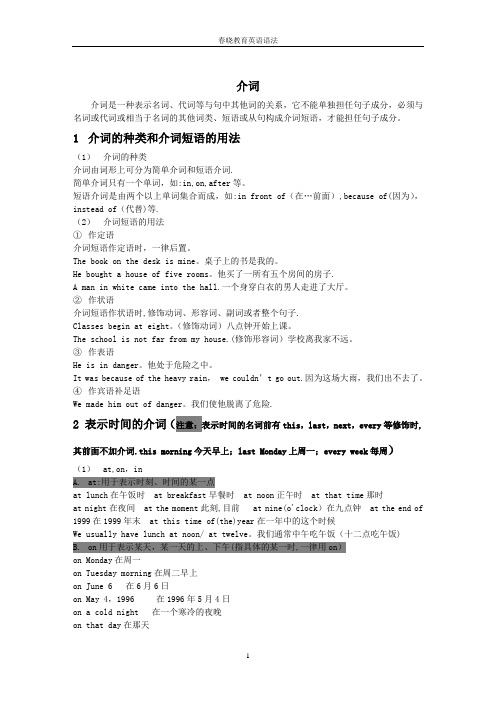
介词介词是一种表示名词、代词等与句中其他词的关系,它不能单独担任句子成分,必须与名词或代词或相当于名词的其他词类、短语或从句构成介词短语,才能担任句子成分。
1介词的种类和介词短语的用法(1)介词的种类介词由词形上可分为简单介词和短语介词.简单介词只有一个单词,如:in,on,after等。
短语介词是由两个以上单词集合而成,如:in front of(在…前面),because of(因为),instead of(代替)等.(2)介词短语的用法①作定语介词短语作定语时,一律后置。
The book on the desk is mine。
桌子上的书是我的。
He bought a house of five rooms。
他买了一所有五个房间的房子.A man in white came into the hall.一个身穿白衣的男人走进了大厅。
②作状语介词短语作状语时,修饰动词、形容词、副词或者整个句子.Classes begin at eight。
(修饰动词)八点钟开始上课。
The school is not far from my house.(修饰形容词)学校离我家不远。
③作表语He is in danger。
他处于危险之中。
It was because of the heavy rain, we couldn’t go out.因为这场大雨,我们出不去了。
④作宾语补足语We made him out of danger。
我们使他脱离了危险.2 表示时间的介词(注意:表示时间的名词前有this,last,next,every等修饰时,其前面不加介词.this morning今天早上;last Monday上周一;every week每周)(1)at,on,inA.at:用于表示时刻、时间的某一点at lunch在午饭时 at breakfast早餐时 at noon正午时 at that time那时at night在夜间 at the moment此刻,目前 at nine(o'clock)在九点钟 at the end of 1999在1999年末 at this time of(the)year在一年中的这个时候We usually have lunch at noon/ at twelve。
语法归纳介词的分类与用法

语法归纳介词的分类与用法介词是英语语法中的一类虚词,用于连接名词、代词、动词或其他词组,起到指示、限定或补充的作用。
在日常交流中,正确使用介词可以使句子更加准确、通顺,并且更好地表达自己的意思。
本文将对常见的介词分类和用法进行归纳总结。
一、位置介词(Prepositions of Place)1. On(在……上面):- 表示某物处于平面上,例如:on the table(在桌子上)- 表示某物在某个交通工具上,例如:on the bus(在公交车上)2. In(在……里面):- 表示某物处于空间之中,例如:in the room(在房间里)- 表示某物位于某地,例如:in Beijing(在北京)3. At(在……处):- 表示某物在某个具体位置,例如:at the park(在公园里)- 表示某个时间点,例如:at 9 o'clock(在九点)4. Under(在……下面):- 表示某物处于其他物体下方,例如:under the bed(在床底下)- 表示某物位于某个地理位置下方,例如:under the bridge(在桥下)二、方向介词(Prepositions of Direction)1. To(到……):- 表示向某个地点移动,例如:go to the cinema(去电影院)- 表示给予某人或某物,例如:give the book to Tom(把书给了汤姆)2. From(从……来):- 表示从某个地点出发,例如:come from Beijing(从北京来) - 表示某物来源于某处,例如:a gift from my friend(来自我朋友的礼物)3. Into(进入……内):- 表示进入或穿过某个空间,例如:jump into the pool(跳进游泳池)- 表示某物转化为另一种状态,例如:transform into a butterfly (变成蝴蝶)4. Out of(离开……):- 表示离开某个地点,例如:get out of the car(从车里出来)- 表示摆脱某种状态或限制,例如:break out of prison(越狱)三、时间介词(Prepositions of Time)1. In(在……时):- 表示某个具体时间段,例如:in the morning(在早上)- 表示某个季节或年份,例如:in summer(在夏季)2. On(在……日):- 表示具体的某一天,例如:on Monday(在星期一)- 表示节日或特殊的日期,例如:on Christmas Day(在圣诞节)3. At(在……点):- 表示具体的某个时间点,例如:at 2 p.m.(在下午两点)- 表示某个时刻,例如:at midnight(在午夜)4. For(持续时间):- 表示持续的一段时间,例如:study for two hours(学习两个小时) - 表示某事发生的时间跨度,例如:for the whole week(整个星期)四、原因介词(Prepositions of Reason)1. Because of(因为):- 表示某个原因导致某个结果,例如:He couldn't come because of the bad weather(因为天气不好,他不能来)2. Due to(由于):- 表示某个原因导致某个结果,具有正式文体,例如:The train was delayed due to heavy rain(由于大雨,火车晚点了)3. Owing to(由于):- 与 due to 同义,用法上稍显书面,例如:The match was canceled owing to the lack of players(由于队员不足,比赛被取消)五、方式介词(Prepositions of Manner)1. By(通过、以……方式):- 表示某种方法或手段,例如:travel by plane(乘飞机旅行)- 表示某种交通方式,例如:go to work by bus(乘公交车上班)2. With(用……方式):- 表示伴随或使用某种物品,例如:write with a pen(用钢笔写)六、比较介词(Prepositions of Comparison)1. Like(像):- 表示类似、相似,例如:She looks like her mother(她长得像她妈妈)- 表示比较相近的程度,例如:It tastes like chicken(尝起来像鸡肉)2. Unlike(与……不同):- 较 like 相反,表示与某事物不同,例如:He is unlike his brother in personality(他的性格与他弟弟不同)以上是常见的介词分类和用法总结。
初中英语语法知识—介词的分类汇编及答案(2)
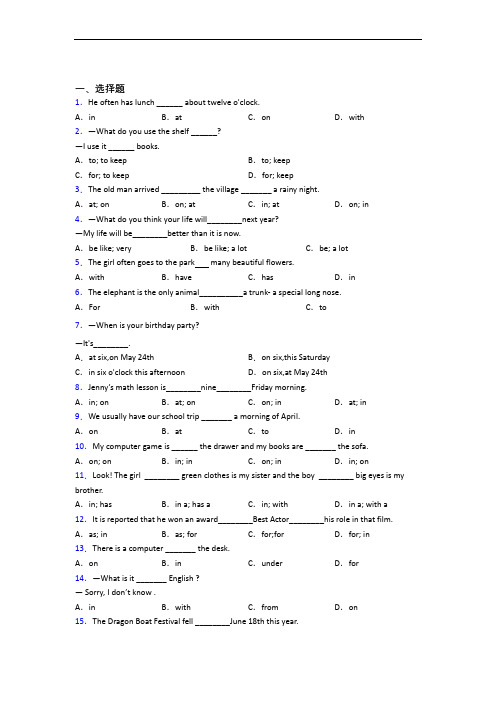
一、选择题1.He often has lunch ______ about twelve o'clock.A.in B.at C.on D.with 2.—What do you use the shelf ______?—I use it ______ books.A.to; to keep B.to; keepC.for; to keep D.for; keep3.The old man arrived _________ the village _______ a rainy night.A.at; on B.on; at C.in; at D.on; in 4.—What do you think your life will________next year?—My life will be________better than it is now.A.be like; very B.be like; a lot C.be; a lot5.The girl often goes to the park many beautiful flowers.A.with B.have C.has D.in6.The elephant is the only animal__________a trunk- a special long nose.A.For B.with C.to7.—When is your birthday party?—It's________.A.at six,on May 24th B.on six,this SaturdayC.in six o'clock this afternoon D.on six,at May 24th8.Jenny’s math lesson is________nine________Friday morning.A.in; on B.at; on C.on; in D.at; in9.We usually have our school trip _______ a morning of April.A.on B.at C.to D.in10.My computer game is ______ the drawer and my books are _______ the sofa. A.on; on B.in; in C.on; in D.in; on 11.Look! The girl ________ green clothes is my sister and the boy ________ big eyes is my brother.A.in; has B.in a; has a C.in; with D.in a; with a 12.It is reported that he won an award________Best Actor________his role in that film. A.as; in B.as; for C.for;for D.for; in 13.There is a computer _______ the desk.A.on B.in C.under D.for 14.—What is it _______ English ?—Sorry, I don’t know .A.in B.with C.from D.on15.The Dragon Boat Festival fell ________June 18th this year.A.in B.to C.on D.from16.My friend, Henry was born June 10th, 1997.A.in B.on C.at D.for17.There________ a hamburger and bananas________there.A.is;in B.are;in C.is;/ D.are;/18.They got married_______ 1960. That means they have been married _______ 1960. A.at; since B.on; in C.in; since D.for; since 19.—It's wonderful, isn't it?— Yes, The large grassland, reaching out far away, looks very beautiful________the blue and clean sky.A.against B.above C.through D.past20.He has a garden __________ a lot of flowers.A.has B.there is C.with21.(2017年安徽) To my pleasure, my family is always _____ me whatever I decide to do. A.above B.behind C.from D.through22.We started out in early spring and headed west the northern part of Asia. A.through B.between C.among D.across23.The next Olympic Games will be held in Japan________ 27th July 2020.A.on B.in C.at D.of24.I want to learn English well because I don’t want to talk with foreigners ________ anybody else.A.by B.through C.across D.at25.–Emma can go out ________ school nights but she must be back ________ ten o’clock.--Oh, I see.A.on, before B.on, after C.in, before D.in, after【参考答案】***试卷处理标记,请不要删除一、选择题1.B解析:B【解析】【分析】【详解】句意:他经常在大约十二点吃午餐。
新初中英语语法知识—介词的分类汇编含解析(2)

一、选择题1.--Which is your teacher?--The one thick(厚厚的)glasses over his eyes is.A.wears B.wear C.with D.has2.—There is a hole in the wall. What is it for?—We have a dog. He can get in or out ________ it.A.past B.through C.across D.over 3.—What do you use the shelf ______?—I use it ______ books.A.to; to keep B.to; keepC.for; to keep D.for; keep4.The old man arrived _________ the village _______ a rainy night.A.at; on B.on; at C.in; at D.on; in 5.The girl often goes to the park many beautiful flowers.A.with B.have C.has D.in 6.—What do you think of happiness, Zoe?—I think happiness is a way station too much and too little.A.among B.between C.opposite D.beyond 7.--There are many theatres _________the island.--Yes, Broadway is the southern end of the island..A.at; at B.on; on C.at; on D.on; at 8.Lily often goes to visit her grandma ______ Sundays.A.at B.in C.on D.to9.Jenny’s math lesson is________nine________Friday morning.A.in; on B.at; on C.on; in D.at; in 10.My cousin Mary was born ___ a singing voice.A.from B.in C.with 11.Shanghai is ________ the east of China and _________ the west of Japan. A.in; to B.in; inC.to; to D.to; in12.The boy read English________every morning ________the age of ten.A.on; in B.on; at C.in; at; D./; at 13.My teacher runs ______ the morning. But he doesn't run ______ Sunday morning. A.in;on B.on;in C.in;in D.on;on 14.—What is it _______ English ?—Sorry, I don’t know .A.in B.with C.from D.on 15.The accident took place ________ a cold February evening.A.on B.in C.at D.for16.It is not easy to cross the river ________ a ropeway.A.from B.with C.by D.on17.Did you read the news________the newspapers that Yang Jiang passed away (去世)________the morning of May 25th?A.in; in B.on; in C.in; on D.on; on18.If success is a gate, the road this gate must be made up of difficulties.A.towards B.against C.opposite D.beyond19.—It's wonderful, isn't it?— Yes, The large grassland, reaching out far away, looks very beautiful________the blue and clean sky.A.against B.above C.through D.past20.--Excuse me, Sir. Can you tell me the way to the zoo?--Walk__________the bridge, you'll see the zoo__________your right.A.on; by B.across; at C.across; on D.on; along21.I have to prepare ________my math test________ Friday afternoon.A.at; on B.for; on C.on ;for22.Tom was born________London________May lst, 2001.A.in; in B.in; on C.on; on D.on; in 23.Don’t leave the room _____ the light on .A.in B.on C.about D.with24.I want to learn English well because I don’t want to talk with foreigners ________ anybody else.A.by B.through C.across D.at25.My best friend is now________China, so I want to go________China, too.A.in;on B.on;to C.of;for D.in;to【参考答案】***试卷处理标记,请不要删除一、选择题1.C解析:C【解析】句意:——哪一个是你的老师?——戴着厚厚的眼镜的那个。
初中英语语法全解:初中英语语法全解——介词
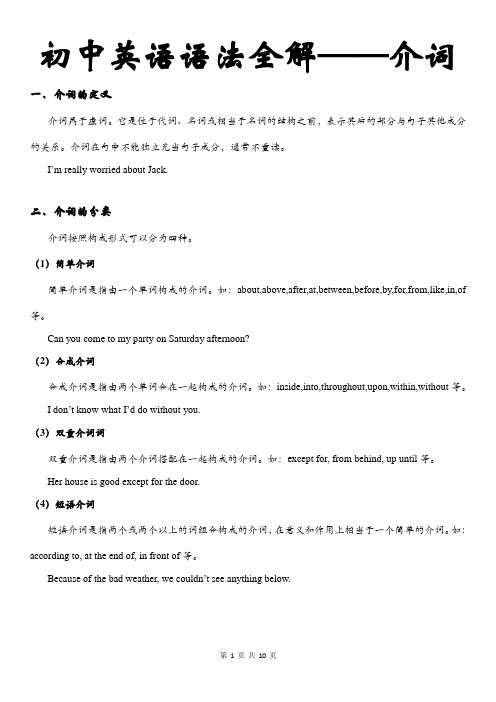
初中英语语法全解——介词一、介词的定义介词属于虚词。
它是位于代词、名词或相当于名词的结构之前,表示其后的部分与句子其他成分的关系。
介词在句中不能独立充当句子成分,通常不重读。
I’m really worried about Jack.二、介词的分类介词按照构成形式可以分为四种。
(1)简单介词简单介词是指由一个单词构成的介词。
如:about,above,after,at,between,before,by,for,from,like,in,of 等。
Can you come to my party on Saturday afternoon?(2)合成介词合成介词是指由两个单词合在一起构成的介词。
如:inside,into,throughout,upon,within,without等。
I don’t know what I’d do without you.(3)双重介词词双重介词是指由两个介词搭配在一起构成的介词。
如:except for, from behind, up until等。
Her house is good except for the door.(4)短语介词短语介词是指两个或两个以上的词组合构成的介词,在意义和作用上相当于一个简单的介词。
如:according to, at the end of, in front of等。
Because of the bad weather, we couldn’t see anything below.三、介词的位置1.介词在句中的通常位置在句子中介词一般放在名词(或代词宾格)之前。
In summer, we often slept under the stars.2.介词在句中的其他位置(1)介词的宾语为疑问词时,介词可以根据情况置于句首或句末。
What are you interested in?(2)介词的宾语是连接代词或连接副词时,介词要后置。
初中介词的用法归纳

初中介词的用法归纳一、关键信息项1、介词的定义及分类2、常见介词的用法及示例3、介词与动词、形容词的搭配4、介词短语在句中的作用5、易混淆介词的辨析6、中考中对介词的考查重点及题型11 介词的定义介词是一种虚词,用来表示名词、代词等与句中其他词的关系,在句中不能单独作句子成分。
111 介词的分类1、时间介词,如 at、in、on 等。
2、地点介词,如 at、in、on、under、behind 等。
3、方式介词,如 by、with、in 等。
4、其他介词,如 for、of、to 等。
12 常见介词的用法及示例121 at 的用法1、表示在具体的时刻,如 at six o'clock。
2、表示在较小的地点,如 at the bus stop。
122 in 的用法1、表示在较长的时间段,如 in the morning。
2、表示在较大的地点,如 in Beijing。
123 on 的用法1、表示在具体的某一天,如 on Monday。
2、表示在物体的表面,如 on the table。
13 介词与动词、形容词的搭配131 与动词的搭配例如,look at(看)、listen to(听)、arrive in/at(到达)等。
132 与形容词的搭配例如,be interested in(对感兴趣)、be good at(擅长)等。
14 介词短语在句中的作用141 作定语如,The girl in red is my sister (in red 作定语修饰 girl)142 作状语如,He studies hard at night (at night 作状语)143 作表语如,He is in the classroom (in the classroom 作表语)15 易混淆介词的辨析151 in 和 onin 表示在里面,on 表示在上面。
152 at 和 inat 表示在较小的地点,in 表示在较大的地点。
新初中英语语法知识—介词的全集汇编附解析
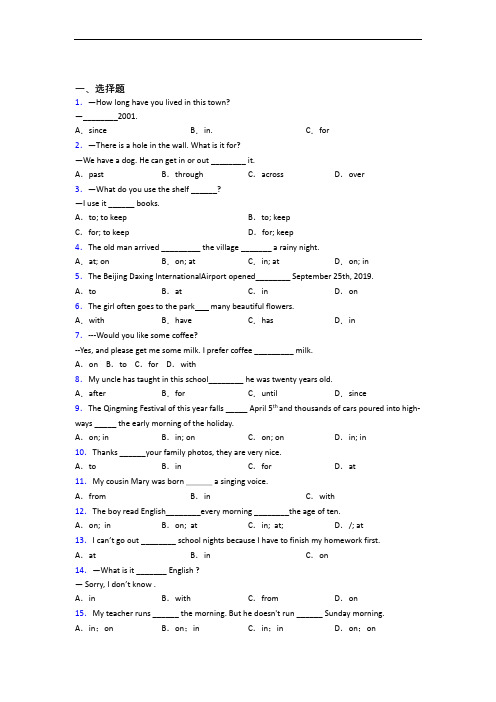
一、选择题1.—How long have you lived in this town?—________2001.A.since B.in. C.for2.—There is a hole in the wall. What is it for?—We have a dog. He can get in or out ________ it.A.past B.through C.across D.over3.—What do you use the shelf ______?—I use it ______ books.A.to; to keep B.to; keepC.for; to keep D.for; keep4.The old man arrived _________ the village _______ a rainy night.A.at; on B.on; at C.in; at D.on; in5.The Beijing Daxing InternationalAirport opened________ September 25th, 2019.A.to B.at C.in D.on6.The girl often goes to the park many beautiful flowers.A.with B.have C.has D.in7.---Would you like some coffee?--Yes, and please get me some milk. I prefer coffee _________ milk.A.on B.to C.for D.with8.My uncle has taught in this school________ he was twenty years old.A.after B.for C.until D.since9.The Qingming Festival of this year falls _____ April 5th and thousands of cars poured into high-ways _____ the early morning of the holiday.A.on; in B.in; on C.on; on D.in; in 10.Thanks ______your family photos, they are very nice.A.to B.in C.for D.at11.My cousin Mary was born ___ a singing voice.A.from B.in C.with12.The boy read English________every morning ________the age of ten.A.on; in B.on; at C.in; at; D./; at13.I can’t go out ________ school nights because I have to finish my homework first.A.at B.in C.on14.—What is it _______ English ?—Sorry, I don’t know .A.in B.with C.from D.on15.My teacher runs ______ the morning. But he doesn't run ______ Sunday morning. A.in;on B.on;in C.in;in D.on;on16.—What is Linda doing?—She is talking ________ the phone with her friend ________ a movie.A.in; for B.on; on C.about; on D.on; about 17.The accident took place ________ a cold February evening.A.on B.in C.at D.for18.It’s very kind ___________ you to lend me your reusable shopping bags.A.of B.for C.to D.with19.If success is a gate, the road this gate must be made up of difficulties.A.towards B.against C.opposite D.beyond 20.—What's the weather _______ in Spring?—Pardon?(什么,请再说一遍)—How is the weather________in Spring?A.like;/ B./;like C.be like;/ D./;be like 21.—It's wonderful, isn't it?— Yes, The large grassland, reaching out far away, looks very beautiful________the blue and clean sky.A.against B.above C.through D.past 22.—Where is Hubei?—It’s _______ the north of Hunan.A.in B.to C.on23.We started out in early spring and headed west the northern part of Asia. A.through B.between C.among D.across24.I want to learn English well beca use I don’t want to talk with foreigners ________ anybody else.A.by B.through C.across D.at25.We have four lessons ________ the morning.A.in B.on C.at D.for【参考答案】***试卷处理标记,请不要删除一、选择题1.A解析:A【解析】【分析】【详解】句意:——你在这个镇上住了多久了?——自2001年以来。
初中英语语法基础知识汇总介词
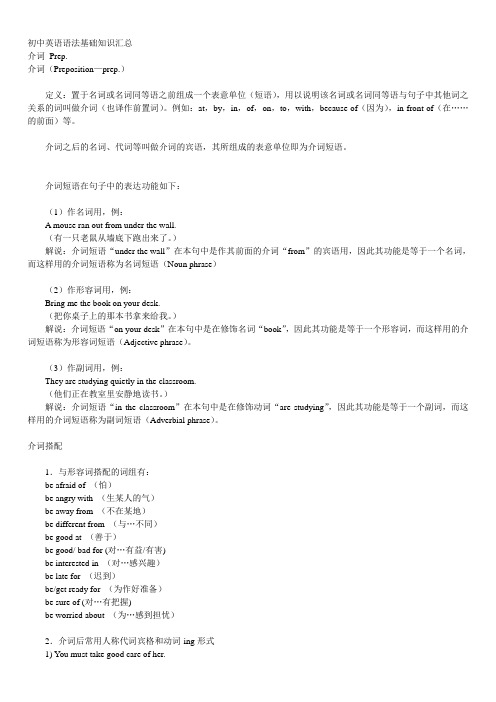
初中英语语法基础知识汇总介词Prep.介词(Preposition—prep.)定义:置于名词或名词同等语之前组成一个表意单位(短语),用以说明该名词或名词同等语与句子中其他词之关系的词叫做介词(也译作前置词)。
例如:at,by,in,of,on,to,with,because of(因为),in front of(在……的前面)等。
介词之后的名词、代词等叫做介词的宾语,其所组成的表意单位即为介词短语。
介词短语在句子中的表达功能如下:(1)作名词用,例:A mouse ran out from under the wall.(有一只老鼠从墙底下跑出来了。
)解说:介词短语“under the wall”在本句中是作其前面的介词“from”的宾语用,因此其功能是等于一个名词,而这样用的介词短语称为名词短语(Noun phrase)(2)作形容词用,例:Bring me the book on your desk.(把你桌子上的那本书拿来给我。
)解说:介词短语“on your desk”在本句中是在修饰名词“book”,因此其功能是等于一个形容词,而这样用的介词短语称为形容词短语(Adjective phrase)。
(3)作副词用,例:They are studying quietly in the classroom.(他们正在教室里安静地读书。
)解说:介词短语“in the classroom”在本句中是在修饰动词“are studying”,因此其功能是等于一个副词,而这样用的介词短语称为副词短语(Adverbial phrase)。
介词搭配1.与形容词搭配的词组有:be afraid of (怕)be angry with (生某人的气)be away from (不在某地)be different from (与…不同)be good at (善于)be good/ bad for (对…有益/有害)be interested in (对…感兴趣)be late for (迟到)be/get ready for (为作好准备)be sure of (对…有把握)be worried about (为…感到担忧)2.介词后常用人称代词宾格和动词-ing形式1) You must take good care of her.2) Thank you for teaching us so well.3.几组易混淆的介词A.“在...之后”in + 一段时间(用于一般将来时)after + 一段时间(用于一般过去时)after + 一点时间(常用于一般将来时)如:The baby stopped crying after half an hour.The baby will stop crying in half an hour.They will visit their teacher after Friday.B.for +一段时间since +过去的一点时间这两者均用于现在完成时,具体在时态部分,我会继续向同学们讲解。
(专题精选)初中英语语法知识—介词的分类汇编及解析

一、选择题1.We have four lessons ________ the morning.A.in B.on C.at D.for2.—What do you use the shelf ______?—I use it ______ books.A.to; to keep B.to; keepC.for; to keep D.for; keep3.The bird’s singing came into my room ______ the window and woke me up in the early morning.A.down B.from C.through D.across4.Lily and Lucy _______ their mother. They have big eyes and yellow hair.A.like both B.both are like C.both like D.are both like 5.--There are many theatres _________the island.--Yes, Broadway is the southern end of the island..A.at; at B.on; on C.at; on D.on; at 6.(2016●泰州市) --As a nurse, her work goes taking care of her patients.--Yes, she always thinks of others.A.beyond B.beside C.behind D.between7.---Would you like some coffee?--Yes, and please get me some milk. I prefer coffee _________ milk.A.on B.to C.for D.with8.—What's the secret good health?—Eating healthy food and taking enough exercise.A.in B.to C.on9.My uncle has taught in this school________ he was twenty years old.A.after B.for C.until D.since10.It’s necessary for Tony to do ____ thing ____ his classmates do.A.same, as B.same, like C.the same, to D.the same, as11.Taiwan is __________ the southeast of China and Hunan is __________ the south of Hubei. A.in;in B.in;on C.on;in D.on;to12.—I feel sad from time to time.Could you give me some advice?—________ sharing your worries with your parents?A.Why don't you B.How aboutC.Why not D.Would you like13.Thanks ______your family photos, they are very nice.A.to B.in C.for D.at14.—What is it _______ English ?—Sorry, I don’t know .A.in B.with C.from D.on15.I can’t go out ________ school nights because I have to finish my homework first.A.at B.in C.on16.Shanghai is ________ the east of China and _________ the west of Japan.A.in; to B.in; inC.to; to D.to; in17.Jim and Tim are talking _______ the phone.A.at B.on C.with D.in18.My teacher runs ______ the morning. But he doesn't run ______ Sunday morning. A.in;on B.on;in C.in;in D.on;on 19.—What is Linda doing?—She is talking ________ the phone with her friend ________ a movie.A.in; for B.on; on C.about; on D.on; about 20.There is a computer _______ the desk.A.on B.in C.under D.for21.They got married_______ 1960. That means they have been married _______ 1960. A.at; since B.on; in C.in; since D.for; since 22.He has a garden __________ a lot of flowers.A.has B.there is C.with23.We started out in early spring and headed west the northern part of Asia. A.through B.between C.among D.across 24.The next Olympic Games will be held in Japan________ 27th July 2020.A.on B.in C.at D.of25.The Qingming Festival of this year falls _____ April 5th and thousands of cars poured into high-ways _____ the early morning of the holiday.A.on; in B.in; on C.on; on D.in; in【参考答案】***试卷处理标记,请不要删除一、选择题1.A解析:A【解析】【分析】【详解】句意:我们上午有四节课。
通辽市初中英语语法知识—介词的全集汇编附解析

一、选择题1.My computer game is ______ the drawer and my books are _______ the sofa.A.on; on B.in; in C.on; in D.in; on2.The old man arrived _________ the village _______ a rainy night.A.at; on B.on; at C.in; at D.on; in3.— Are you going to school________bus?—No, we are going________Mary’s mother’s car.A.by, by B.from, by C.by, in D.in, at4.I bought the tomatoes ________ the vegetable stall.A.at B.in C.on D.from5.—Do you know the girl ________ red skirts?—Yes, she is my sister.A.at B.on C.in D.to6.The Beijing Daxing InternationalAirport opened________ September 25th, 2019.A.to B.at C.in D.on7.Lily and Lucy _______ their mother. They have big eyes and yellow hair.A.like both B.both are like C.both like D.are both like 8.—When is your birthday party?—It's________.A.at six,on May 24th B.on six,this SaturdayC.in six o'clock this afternoon D.on six,at May 24th9.It’s necessary for Tony to do ____ thing ____ his classmates do.A.same, as B.same, like C.the same, to D.the same, as10.______ Sunday morning my sister usually does her homework, and ______ the afternoon she usually plays tennis.A.On; on B.In; in C.On; in D.In; on 11.— What kind of home do you ? — A flat three bedrooms.A.live in; with B.live; with C.live in; has D.live; has 12.—What do you use the shelf ______?—I use it ______ books.A.to; to keep B.to; keepC.for; to keep D.for; keep13.We usually have our school trip _______ a morning of April.A.on B.at C.to D.in14.We started out in early spring and headed west the northern part of Asia. A.through B.between C.among D.across 15.Shanghai is ________ the east of China and _________ the west of Japan.A.in; to B.in; inC.to; to D.to; in16.The river runs_______ the city. And there are many beautiful bridges_______ the river. A.across; through B.through; overC.through; through D.across; over17.It is not easy to cross the river ________ a ropeway.A.from B.with C.by D.on18.---Do you prefer coffee _____milk in it?---Sometimes, but most of the time I ______drink black coffee.A.or, would rather B.with, prefer C.with, would rather D.to, prefer 19.Did you read the news________the newspapers that Yang Jiang passed away (去世)________the morning of May 25th?A.in; in B.on; in C.in; on D.on; on 20.They got married_______ 1960. That means they have been married _______ 1960. A.at; since B.on; in C.in; since D.for; since 21.--Excuse me, Sir. Can you tell me the way to the zoo?--Walk__________the bridge, you'll see the zoo__________your right.A.on; by B.across; at C.across; on D.on; along22.—Where is Hubei?—It’s _______ the north of Hunan.A.in B.to C.on23.—Hi, Jane. What time do you get up __________ weekdays?—I usually get up __________ about six o’clock.A.in; at B.on; at C.at; at D.on; on 24.—What are these ________ English?—These are egg-cups.A.at B.to C.on D.in25.My cousin Mary was born ___ a singing voice.A.from B.in C.with【参考答案】***试卷处理标记,请不要删除一、选择题1.D解析:D【解析】句意:我的电脑游戏在抽屉里,我的书在沙发上。
初中英语语法知识—介词的分类汇编含解析

一、选择题1.There is a computer _______ the desk.A.on B.in C.under D.for2.— Are you going to school________bus?—No, we are going________Mary’s mother’s car.A.by, by B.from, by C.by, in D.in, at3.—What do you think of happiness, Zoe?—I think happiness is a way station too much and too little.A.among B.between C.opposite D.beyond4.The bird’s singing came into my room ______ the window and woke me up in the early morning.A.down B.from C.through D.across5.(2016●泰州市) --As a nurse, her work goes taking care of her patients.--Yes, she always thinks of others.A.beyond B.beside C.behind D.between 6.—Mary's birthday is ________ March. What about Lucy's?—Her birthday is ________ December 10th.A.in;on B.on;in C.on;on7.Taiwan is __________ the southeast of China and Hunan is __________ the south of Hubei. A.in;in B.in;on C.on;in D.on;to8.If you can’t read the article, it will be meaningless to you. The –less in the word “meaningless” means .A.with B.without C.full of D.out of9.Thanks ______your family photos, they are very nice.A.to B.in C.for D.at10.He is__________ outgoing student long hair..A.a,with, B.an,with C.a,of D.an,of11.We usually have our school trip _______ a morning of April.A.on B.at C.to D.in12.Which of the following(下面) is right?A.The boy begin to clean the room with his sister.B.In the Spring Festival, the children often get lucky money.C.How is weather like in spring there?D.You’d better not read a book in the sun.13.--Which is your teacher?--The one thick(厚厚的)glasses over his eyes is.A.wears B.wear C.with D.has14.Don’t leave the room _____ the light on .A.in B.on C.about D.with15.It is not easy to cross the river ________ a ropeway.A.from B.with C.by D.on16.My friend, Henry was born June 10th, 1997.A.in B.on C.at D.for17.If success is a gate, the road this gate must be made up of difficulties. A.towards B.against C.opposite D.beyond 18.—What's the weather _______ in Spring?—Pardon?(什么,请再说一遍)—How is the weather________in Spring?A.like;/ B./;like C.be like;/ D./;be like 19.There________ a hamburger and bananas________there.A.is;in B.are;in C.is;/ D.are;/ 20.—It's wonderful, isn't it?— Yes, The large grassland, reaching out far away, looks very beautiful________the blue and clean sky.A.against B.above C.through D.past21.I have to prepare ________my math test________ Friday afternoon.A.at; on B.for; on C.on ;for22.—Hi, Jane. What time do you get up __________ weekdays?—I usually get up __________ about six o’clock.A.in; at B.on; at C.at; at D.on; on 23.—What are these ________ English?—These are egg-cups.A.at B.to C.on D.in24.We started out in early spring and headed west the northern part of Asia. A.through B.between C.among D.across 25.—What is Linda doing?—She is talking ________ the phone with her friend ________ a movie.A.in; for B.on; on C.about; on D.on; about 【参考答案】***试卷处理标记,请不要删除一、选择题1.A解析:A【解析】试题分析:句意:在书桌上有一台电脑。
初中英语介词语法知识点总结(讲义及答案)
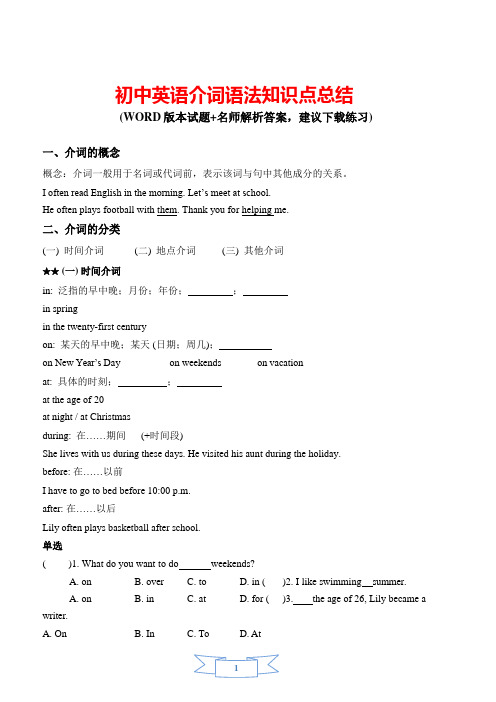
初中英语介词语法知识点总结(WORD版本试题+名师解析答案,建议下载练习)一、介词的概念概念:介词一般用于名词或代词前,表示该词与句中其他成分的关系。
I often read English in the morning. Let’s meet at school.He often plays football with them. Thank you for helping me.二、介词的分类(一) 时间介词(二) 地点介词(三) 其他介词★★ (一) 时间介词in: 泛指的早中晚;月份;年份;;in springin the twenty-first centuryon: 某天的早中晚;某天 (日期;周几);on New Year’s Day on weekends on vacationat: 具体的时刻;;at the age of 20at night / at Christmasduring: 在……期间(+时间段)She lives with us during these days. He visited his aunt during the holiday.before: 在……以前I have to go to bed before 10:00 p.m.after: 在……以后Lily often plays basketball after school.单选( )1. What do you want to do weekends?A. onB. overC. toD. in ( )2. I like swimming summer.A. onB. inC. atD. for ( )3. the age of 26, Lily became a writer.A. OnB. InC. ToD. At( )4. Jim learned to drive ___ the holiday.A. atB. duringC. toD. for( )5. He went to Shanghai July 7, 2013 and came backa cold morning last year.A. in; onB. on; inC. on; onD. in; in( )6. My mom often tells me to go back home dark(黄昏).A. afterB. toC. beforeD. for( )7. A lot of people are here _ vacation every year.A. ofB. onC. atD. with★★ (二) 地点介词1.地点介词 at, in, onat: “在……”(表一个点或小地方)at home at Mr. Cool’s Clothes Storeat the pool at Central Parkin: “在……里” (表一个范围或大地方) in China in Beijing in the water in the parkon: “在……上” (表一个表面,并接触) on the floor on the wall 对比这三个句子:They stood at the door and waited.他们站在门口等着。
初中英语九大类介词用法详解!

初中英语九⼤类介词⽤法详解!⼀.表⽰⽅位的介词: in, to, on. in表⽰在某地范围之内。
如:Shanghai is/lies in the east of China.上海在中国的东部。
2. to表⽰在某地范围之外。
如:Japan is/lies to the east of China.⽇本位于中国的东⾯。
3. on表⽰与某地相邻或接壤。
如:Mongolia is/lies on the north of China.蒙古国位于中国北边。
⼆,表⽰计量的介词: at, for, by,at表⽰“以...速度 , 以....价格.” 。
如:It flies at about 900 kilometers an hour.它以每⼩时900公⾥的速度飞⾏。
I sold my car at a high price.我以⾼价出售了我的汽车。
2. for表⽰“⽤.....交换,以.....为代价” 。
如:He sold his car for 500 dollars.他以五百元把车卖了。
注意:at表⽰单价(price), for表⽰总钱数。
by表⽰.....计”,后跟度量单位。
如:They paid him by the month.他们按⽉给他计酬。
Here eggs are sold by weight.在这⾥鸡蛋是按重量卖的。
三、表⽰材料的介词: of, from, in,of成品仍可看出原料。
如:This box is made of paper.这个盒⼦是纸做的。
2. from成品已看不出原料。
如:Wine is made from grapes.葡萄酒是葡萄酿成的。
in表⽰⽤某种材料或语⾔。
如:Please fill in the form in pencil first.请先⽤铅笔填写这个表格。
They talk in English.他们⽤英语交谈。
注意: in指⽤材料,不⽤冠词;⽽with指⽤⼯具,要⽤冠词。
初中英语语法基础——介词专题讲解 (附同步练习试题)
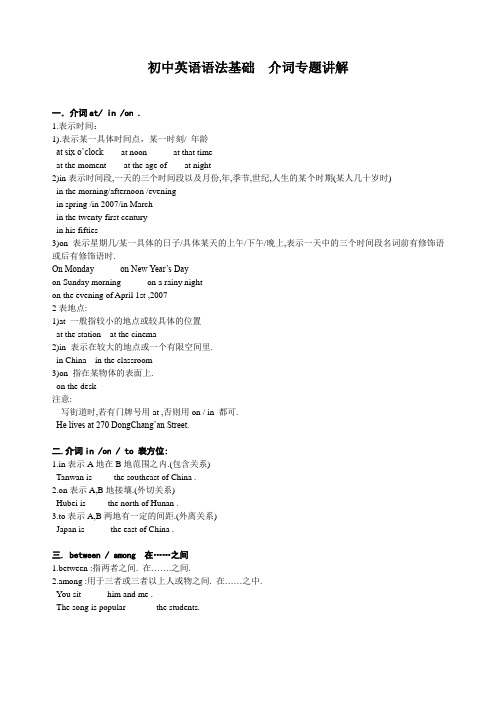
初中英语语法基础介词专题讲解一.介词at/ in /on .1.表示时间:1).表示某一具体时间点,某一时刻/ 年龄at six o’clock at noon at that timeat the moment at the age of at night2)in表示时间段,一天的三个时间段以及月份,年,季节,世纪,人生的某个时期(某人几十岁时)in the morning/afternoon /eveningin spring /in 2007/in Marchin the twenty-first centuryin his fifties3)on表示星期几/某一具体的日子/具体某天的上午/下午/晚上,表示一天中的三个时间段名词前有修饰语或后有修饰语时.On Monday on New Year’s Dayon Sunday morning on a rainy nighton the evening of April 1st ,20072表地点:1)at 一般指较小的地点或较具体的位置at the station at the cinema2)in 表示在较大的地点或一个有限空间里.in China in the classroom3)on 指在某物体的表面上.on the desk注意:写街道时,若有门牌号用at ,否则用on / in 都可.He lives at 270 DongChang’an Street.二.介词in /on / to 表方位:1.in表示A地在B地范围之内.(包含关系)Tanwan is ____ the southeast of China .2.on表示A,B地接壤.(外切关系)Hubei is ____ the north of Hunan .3.to表示A,B两地有一定的间距.(外离关系)Japan is _____ the east of China .三. between / among 在……之间1.between :指两者之间. 在…….之间.2.among :用于三者或三者以上人或物之间. 在……之中.You sit _____ him and me .The song is popular ______ the students.四.after / in 在……之后 before / in 在……之前1. after1)after + 时间段. 表示以过去某一时刻为起点的一段时间之后, 用于过去时.2)after 作介词. after doing sth.2.in +一段时间. 表示说话时或以现在为起点的将来一段时间之后.用于将来时.He came back ______ two days .He will go home___finishing his homework .He will come back _____ two days .3. before 多用于时间点或一件事之前发生,即“先于……;在……之前”He left the office bofore I got there. I’ll be back before five o’clock.4. ago 时间段+ ago 表示“多久之前”时态通常用:一般过去时I met Tom two days ago.五.with / in / by 表示“用……”1.with 表示“用…” 一般指有形的工具/ 手段/ 人体器官.He cut the apple into halves ____ a knife .注: with 表伴随, “带有,含有”He came in _____ a big smile on his face .2.in表示用某种语言,方式,途径. 或书写/绘画所用的材料. 也可表交通方式.Can you say it _____English ?He wrote a letter ____ blue ink .3.by表示乘坐交通工具, 表示方式,方法I study for a test _____ working with a group .He makes a living ____ selling newspapers .注意: 同义词组1).by phone = on the phone2).by car = in a car3).in pen = with a pen = with pens六.across / through / over / by 经过1.across 指横穿,穿过. 表示动作从某一物体表面上经过.2.through 指穿过,透过,表示从某一物体空间内通过.3.over 表示从某人或某物的上空经过或越过,不与表面接触.4.by 表示从某人/某物的旁边经过.Can you swim ______ the river ?the elephant is so big that it can’t go _____ the gate .I don’t think anyone can jump ___ the fenc e.I walked _____ the bank of China yesterday .七.in front of / in the front of1.in the front of 表示在…….内部的前面2.in front of 表示在……外面的前面There is a desk in _____ front of our classroom .There is a big tree in _____ front of our classroom.八.其它介词的用法:1.at的其它用法.1).表示“从事或正在做某事”,其后加的名词往往不加冠词.She is at work now = She is working now .2)at表示“价格或速度”The train ran at 120 kilometers an hour .2.in的其它用法:1)in表示“在……方面”词组:do well in = be good atbe weak in2)in 表示“穿着”后接表颜色的词或衣服.词组: be in +衣服= be wearing +衣服3)in作副词, “在家” = at home3.like 的用法:1).像/和……一样. 常与系动词连用.词组: look like sound like2).与what 连用, “是什么样子, 怎样”.What is he like ? He is kind .4.off的用法:1).从……下来, 脱离某物体.词组: fall off2). “休假”通常放在时间名词之后.词组: have +时间+ offHe has n’t had a night off for two hours .5.except / besides1).except 除了…….之外, 都……. . 不包括在范围之内.注: nothing but … 除了……之外,什么也没有.2).besides除了……之外,还有…… . 包括在范围之内.We all went swimming ______ Lucy .There is _______ a letter in the box .We study Japanese and French____ English .6.with / without1).with具有,含有反义词: without 没有词组: with the help of = with one’s help =because of = thanks towithout one’s help2).without 的用法:A).without + sb./ sth. 没有某人或某物B).without + doing sth . He lef t here without____(say ) “Goodbye”to usC). without sth 常与if 引导的否定的条件句.If there is no water , we can’t live .= We can’t live ______ _______ .7.on the tree /in the treeon the tree 表示“树上本身长的东西” 在树上.in the tree 表示“外界的物体进入树中” 人或物在树上.There are some apples _____ the tree .There is a boy ____ the tree.8.表示“数量的介词”about , round around , over1). about , round around表示“大约……”2).over 表示“超过”= more than.9.inside / outsideInside 在……里面------反义词:outside在….外面10.in the wall /on the wallin the wall 表示“门窗在墙上” on the wall 表示“某东西张贴或挂在墙上”九.不用介词的情况:1).当时间状语为: tonight, today, yesterday, tomorrow 等时,不用介词. What are you going to do tonight ?2).含有this, that, these, those, last, next, every/each day等时间状语.He went to Wuhan last week . I drink milk every day.3).以all 开头的时间状语前面不用介词.He has worked all day .4).以some ,any, one 等构成的时间状语前不用介词.He met a bad man one cold morning. = He met a bad man on a cold morning.介词专题小测:一、单项选择题。
初中英语知识点归纳介词的分类和用法
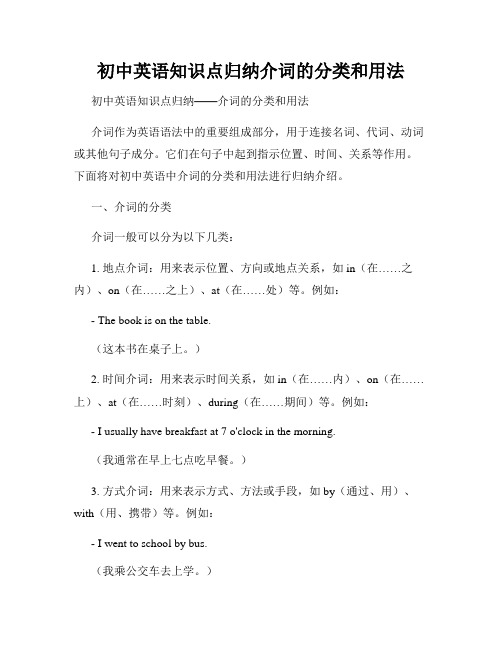
初中英语知识点归纳介词的分类和用法初中英语知识点归纳——介词的分类和用法介词作为英语语法中的重要组成部分,用于连接名词、代词、动词或其他句子成分。
它们在句子中起到指示位置、时间、关系等作用。
下面将对初中英语中介词的分类和用法进行归纳介绍。
一、介词的分类介词一般可以分为以下几类:1. 地点介词:用来表示位置、方向或地点关系,如in(在……之内)、on(在……之上)、at(在……处)等。
例如:- The book is on the table.(这本书在桌子上。
)2. 时间介词:用来表示时间关系,如in(在……内)、on(在……上)、at(在……时刻)、during(在……期间)等。
例如:- I usually have breakfast at 7 o'clock in the morning.(我通常在早上七点吃早餐。
)3. 方式介词:用来表示方式、方法或手段,如by(通过、用)、with(用、携带)等。
例如:- I went to school by bus.(我乘公交车去上学。
)4. 原因介词:用来表示原因、目的或理由,如for(因为、为了)、because of(因为)等。
例如:- He was absent from school because of illness.(他因为生病缺课了。
)5. 目的介词:用来表示目的、结果或效果,如for(为了)、to(为了、到……去)等。
例如:- We study hard for good grades.(我们努力学习是为了取得好成绩。
)6. 关系介词:用来表示关系、连接或起始点,如of(……的)、from(从……来)等。
例如:- The capital of China is Beijing.(中国的首都是北京。
)7. 引导介词:用来引导特定的短语或句子结构,如with(与……一起)、without(没有)等。
例如:- I can't live without my phone.(没有手机,我无法生活。
介词知识点详解(初中英语专项复习)1

介词知识点详解(初中英语专项复习)1.介词的概念介词是一种虚词,一般用在名词、代词等的前面,用来表示其后面的名词或者相当于名词的词或短语和其他句子成分的关系,在句子中不能单独作句子成分,需和它后面的词共同充当句子成分。
介词后面的名词或者相当于名词的词或短语叫介词宾语。
可以作介词宾语的词通常有:1)名词、代词或从句。
如:He lives near the school.他居住在学校附近。
Our teacher was very angry with him.我们的老师非常生他的气。
2)动名词。
如:They have a good idea for solving this problem.他们有一个解决这个问题的好方法。
3)动词不定式(仅限于介词but,except)。
如:I want nothing except to sleep.除了睡觉,我什么也不想做。
2.介词的种类1)根据结构分类简单介词:即由一个词构成的单一介词。
如:for,at,in,on,of,to等。
复合介词:即由两个词组合在一起的介词,也称合成介词。
如:without,inside,outside,into,within短语介词:即由短语构成的介词。
如:because of,according to,thanks to等。
2)根据意义分类表示地点的介词:at,behind,beside,around,near,on,by,in front of,across等。
表示时间的介词:about,at,after,before,by,during,in,over,past,since,until等。
表示原因的介词:for,with,from等。
表示手段和方式的介词:by,in,with等。
表示“除去”的介词:but,except,besides等。
表示其他含义的介词:about (关于,大约), on (关于), without (没有), off (从……离开), instead of (代替), with (和)等。
【中考英语语法汇总】介词语法讲解
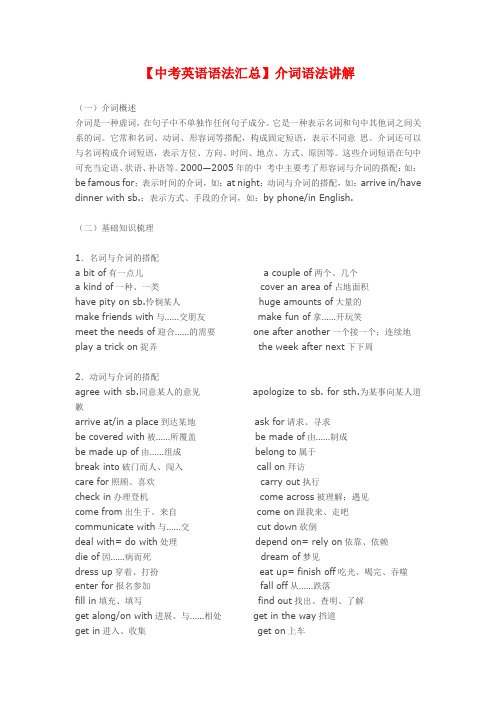
【中考英语语法汇总】介词语法讲解(一)介词概述介词是一种虚词,在句子中不单独作任何句子成分。
它是一种表示名词和句中其他词之间关系的词。
它常和名词、动词、形容词等搭配,构成固定短语,表示不同意思。
介词还可以与名词构成介词短语,表示方位、方向、时间、地点、方式、原因等。
这些介词短语在句中可充当定语、状语、补语等。
2000—2005年的中考中主要考了形容词与介词的搭配:如:be famous for;表示时间的介词,如:at night;动词与介词的搭配,如:arrive in/have dinner with sb.;表示方式、手段的介词,如:by phone/in English.(二)基础知识梳理1.名词与介词的搭配a bit of有一点儿 a couple of两个、几个a kind of一种、一类 cover an area of占地面积have pity on sb.怜悯某人huge amounts of大量的make friends with与……交朋友 make fun of拿……开玩笑meet the needs of迎合……的需要 one after another一个接一个;连续地play a trick on捉弄 the week after next下下周2.动词与介词的搭配agree with sb.同意某人的意见 apologize to sb. for sth.为某事向某人道歉arrive at/in a place到达某地 ask for请求、寻求be covered with被……所覆盖 be made of由……制成be made up of由……组成 belong to属于break into破门而人、闯入 call on拜访care for照顾、喜欢 carry out执行check in办理登机 come across被理解;遇见come from出生于、来自 come on跟我来、走吧communicate with与……交cut down砍倒deal with= do with处理depend on= rely on依靠、依赖die of因……病而死dream of梦见dress up穿着、打扮 eat up= finish off吃光、喝完、吞噬enter for报名参加fall off从……跌落fill in填充、填写 find out找出、查明、了解get along/on with进展、与……相处 get in the way挡道get in进入、收集 get on上车get off下车 get rid of摆脱get ready for为….作准备 get to到达get tired of对……感到厌倦 go in for参加、从事于、酷爱,'^ go ahead先走、向前走;去吧 go for a swim去游泳go on a diet实行节食 go over复习go on with继续做某事 grow up长大、成长hand in上交 hear from收到……的来信hear of听说 help sb. with sth.帮助某人做某事hold on等等(别挂电话)hold up举起hurry off匆忙离开join.n参加、加入keep... from使……不做 keep in touch with与……保持联系keep off阻挡;不让接近 knock over撞倒、撞翻later on过来;后来 laugh at嘲笑learn.., from向……学习 leave for动身去let out放出 line up整队;排成行live on靠……为生look after照顾;照料look at看;观看 look for寻找look forward to期待着 look like看上去像;显得look out of从……朝外看look up查寻;抬头看make out辨认出make up one's mind下决心meet with遭遇 operate on sb.为……动手术pay for付……钱 pick out拾起play with玩弄point at指向;指着point out指出praise sb. for sth.为某事表扬某人prefer... to(比起……来)更喜欢 prepare for准备protect... from保护……免受 pull down推倒put off延期put on穿;戴上;上演put out伸出 put up举起;挂起run after追捕;追踪 run away逃跑search for搜寻;搜查see off为……送行sell out售完 set out/off for出发去……;起程去……set up建立;设立. shake hands with与……握手share with与……分享show off炫耀show sb around带某人参观 shut up住口speed up加快速度stop...from阻止……做take away拿走 take care of照料take charge of负责;管理;take hold of抓住take in吸入 take off脱掉(衣物等);起飞take out取出take part in参加take up开始从事 talk about谈到talk to/with与...谈话 tell... from区别;分辨think of想起;想到 think over仔细考虑throw away扔掉 tie up捆绑try on 试穿turn down(把音量)调低turn into变成 turn off关掉(电灯、电视、收音机等)turn on开,旋开(电灯、电视、收音机等) turn over翻车;翻阅;翻身turn out结果是;证明是 wake up醒来;叫醒wait for等待;等候 write down写下work out算出;制定出经典例题:1.The foreigners arrived __________Shanghai __________ night.A. at…atB. in…atC. in... inD. at... in2. Wushu is becoming more and more popular __________ westerners.A. amongB. betweenC. inD.within3. __________ the help of the teachers, we decorated. Ourclassroom__________lanterns, flowers and pictures yesterday.A. Under... withoutB. Under... amongC. With... withD.With...between4. The cakes __________ the shape of a round moon is called mooncakes.A. likeB. look likeC. asD. likes5.改错:The manager told his secretary that he would be back __________ three-thirty.A. inB. afterC. beforeD. at6. It was clever __________ the boy to work __________ the mathsproblems in less than ten minutes.A. for…outB. of... outC. for...onD. of... on7. My aunt Jane tried her best to reduce her weight ________ 6kg.A.about B.at C.to D.by8. In my opinion, I agree __________ you __________that.A. to… withB. with…toC. with.., withD. with.., on9. I am familiar__________ this school since I have worked here for morethan fifteen years.A. withB. toC. aboutD. of10. Would you please look __________ my baby girl __________ myabsence?A. after…duringB. for…duringC. after… inD. to...in11. Mexico is ________ the south of America.A. inB. toC. onD. of12. The boy ____ the bike is Jackie Hu from Britain.A. byB. onC. inD. with13. Smoking and drinking are not good _______ your health.A. forB. toC. ofD. at14. Can you see the cat hiding __________ the tree?A. onB. underC. overD. in15. The litter bin__________ the corner of the room is a present from mybrother.A. atB. onC. inD. among16. It's fun to see a large number of stars shining in the sky ________ aclear night.A. atB. inC. onD. of1. 【解析】答案是B。
新初中英语语法知识—介词的真题汇编及答案解析(2)

一、选择题1.He is__________ outgoing student long hair..A.a,with, B.an,with C.a,of D.an,of2.— Are you going to school________bus?—No, we are going________Mary’s mother’s car.A.by, by B.from, by C.by, in D.in, at3.—Do you know the girl ________ red skirts?—Yes, she is my sister.A.at B.on C.in D.to4.Lily and Lucy _______ their mother. They have big eyes and yellow hair.A.like both B.both are like C.both like D.are both like 5.Our school plans to have a parents’ meeting_______ the afternoon_______ January 27th. A.in; of B.on; in C.on; of D.in; at 6.—Mary's birthday is ________ March. What about Lucy's?—Her birthday is ________ December 10th.A.in;on B.on;in C.on;on7.---Would you like some coffee?--Yes, and please get me some milk. I prefer coffee _________ milk.A.on B.to C.for D.with8.Lily often goes to visit her grandma ______ Sundays.A.at B.in C.on D.to9.My uncle has taught in this school________ he was twenty years old.A.after B.for C.until D.since 10.Taiwan is __________ the southeast of China and Hunan is __________ the south of Hubei. A.in;in B.in;on C.on;in D.on;to 11.Jenny’s math lesson is________nine________Friday morning.A.in; on B.at; on C.on; in D.at; in12.The old man arrived _________ the village _______ a rainy night.A.at; on B.on; at C.in; at D.on; in 13.Thanks ______your family photos, they are very nice.A.to B.in C.for D.at14.I want to learn English well because I don’t want to talk with foreigners ________ anybody else.A.by B.through C.across D.at15.---What’s your hobby ? ---______collecting balls, I also like different kinds of CDs. A.Besides B.Except C.Beside D.About16.We usually have our school trip _______ a morning of April.A.on B.at C.to D.in17.—Where is Tom?—He is playing football ___________ the playground.A.of B.to C.on D.from 18.There is a computer _______ the desk.A.on B.in C.under D.for19.The accident took place ________ a cold February evening.A.on B.in C.at D.for20.— Hey, Nancy. What do you usually do ________ rainy days? — I usually listen to music. A.in B.on C.at D.to21.Bill doesn't like playing football,but he often watches football matches (比赛)_____ TV. A.in B.on C.to D.with22.After working her way around the world, Annie ended up English as a foreign language. A.teach B.taughtC.teaching D.to teach23.Tom was born________London________May lst, 2001.A.in; in B.in; on C.on; on D.on; in 24.—Hi, Jane. What time do you get up __________ weekdays?—I usually get up __________ about six o’clock.A.in; at B.on; at C.at; at D.on; on 25.—When does your mother go shopping?—Usually Sunday morning.A.on B.in C.at D.after【参考答案】***试卷处理标记,请不要删除一、选择题1.B解析:B【解析】【分析】【详解】句意:他是一位留着长发的外向的学生。
初中英语语法知识—介词的分类汇编附解析(1)

一、选择题1.There is an old bridge __________the river. Be careful (小心) when you ________________ it. A.over; across B.over; cross C.on; cross D.on; across 2.—Why ______ you so busy these days?—Because they arrived ______ London ______ the morning of July1.A.are; in , in B.are; in , on C.do; on , in D.do; at , on3.— Are you going to school________bus?—No, we are going________Mary’s mother’s car.A.by, by B.from, by C.by, in D.in, at4.--There are many theatres _________the island.--Yes, Broadway is the southern end of the island..A.at; at B.on; on C.at; on D.on; at5.The moonlight is shining in the window. Everything in the room looks so beautiful. A.over B.through C.across D.past6.Jiangsu Development Summit was open _____ May 20th in Nanjing.A.on B.in C.at D.by7.Lily often goes to visit her grandma ______ Sundays.A.at B.in C.on D.to8.—What's the secret good health?—Eating healthy food and taking enough exercise.A.in B.to C.on9.My uncle has taught in this school________ he was twenty years old.A.after B.for C.until D.since10.It’s necessary for Tony to do ____ thing ____ his classmates do.A.same, as B.same, like C.the same, to D.the same, as11.Taiwan is __________ the southeast of China and Hunan is __________ the south of Hubei. A.in;in B.in;on C.on;in D.on;to12.—I feel sad from time to time.Could you give me some advice?—________ sharing your worries with your parents?A.Why don't you B.How aboutC.Why not D.Would you like13.We have four lessons ________ the morning.A.in B.on C.at D.for14.—What is it _______ English ?—Sorry, I don’t know .A.in B.with C.from D.on15.I can’t go out ________ school nights because I have to finish my homework first.A.at B.in C.on16.We usually have our school trip _______ a morning of April.A.on B.at C.to D.in17.My computer game is ______ the drawer and my books are _______ the sofa.A.on; on B.in; in C.on; in D.in; on18.Bill doesn't like playing football,but he often watches football matches (比赛)_____ TV. A.in B.on C.to D.with19.Did you read the news________the newspapers that Yang Jiang passed away (去世)________the morning of May 25th?A.in; in B.on; in C.in; on D.on; on20.If success is a gate, the road this gate must be made up of difficulties.A.towards B.against C.opposite D.beyond 21.Tom and Black clothes store is ______a great sale. It has nice shirts _______all colors. A.at; in B.on; at C.of; in22.After working her way around the world, Annie ended up English as a foreign language. A.teach B.taughtC.teaching D.to teach23.He has a garden __________ a lot of flowers.A.has B.there is C.with24.(2017年安徽) To my pleasure, my family is always _____ me whatever I decide to do. A.above B.behind C.from D.through25.— What kind of home do you ? — A flat three bedrooms.A.live in; with B.live; with C.live in; has D.live; has【参考答案】***试卷处理标记,请不要删除一、选择题1.B解析:B【解析】【分析】【详解】句意:河上有一座古老的桥。
- 1、下载文档前请自行甄别文档内容的完整性,平台不提供额外的编辑、内容补充、找答案等附加服务。
- 2、"仅部分预览"的文档,不可在线预览部分如存在完整性等问题,可反馈申请退款(可完整预览的文档不适用该条件!)。
- 3、如文档侵犯您的权益,请联系客服反馈,我们会尽快为您处理(人工客服工作时间:9:00-18:30)。
一、选择题1.My teacher runs ______ the morning. But he doesn't run ______ Sunday morning.A.in;on B.on;in C.in;in D.on;on2.North Korea is________Asia. It’s________the northeast of China and________the west of Japan.A.in, to, on B.in, on, to C.on, in, to D.to, on, in 3.Jiangsu Development Summit was open _____ May 20th in Nanjing.A.on B.in C.at D.by4.—What's the secret good health?—Eating healthy food and taking enough exercise.A.in B.to C.on5.It’s necessary for Tony to do ____ thing ____ his classmates do.A.same, as B.same, like C.the same, to D.the same, as6.______ Sunday morning my sister usually does her homework, and ______ the afternoon she usually plays tennis.A.On; on B.In; in C.On; in D.In; on7.Taiwan is _________ the southeast of China.A.to B.in C.from D.on8.He often plays basketball ______five o’clock.A.in B.for C.on D.at9.If you can’t read the article, it will be meaningless to you. The –less in the word “meaningless” means .A.with B.without C.full of D.out of10.---What’s your hobby ? ---______collecting balls, I also like different kinds of CDs. A.Besides B.Except C.Beside D.About11.My cousin Mary was born ___ a singing voice.A.from B.in C.with12.—What do you use the shelf ______?—I use it ______ books.A.to; to keep B.to; keepC.for; to keep D.for; keep13.The river runs_______ the city. And there are many beautiful bridges_______ the river. A.across; through B.through; overC.through; through D.across; over14.Can you jiaozi English?A.say;with B.speak;in C.say;in D.tell;about15.—What is Linda doing?—She is talking ________ the phone with her friend ________ a movie.A.in; for B.on; on C.about; on D.on; about 16.Bill doesn't like playing football,but he often watches football matches (比赛)_____ TV. A.in B.on C.to D.with17.Did you read the news________the newspapers that Yang Jiang passed away (去世)________the morning of May 25th?A.in; in B.on; in C.in; on D.on; on18.If success is a gate, the road this gate must be made up of difficulties.A.towards B.against C.opposite D.beyond 19.Nature has given us the ability to learn________watching others. Children do it naturally. A.by B.in C.on20.They got married_______ 1960. That means they have been married _______ 1960. A.at; since B.on; in C.in; since D.for; since 21.Tom was born________London________May lst, 2001.A.in; in B.in; on C.on; on D.on; in 22.—What are these ________ English?—These are egg-cups.A.at B.to C.on D.in23.He has a garden __________ a lot of flowers.A.has B.there is C.with24.The next Olympic Games will be held in Japan________ 27th July 2020.A.on B.in C.at D.of25.My computer game is ______ the drawer and my books are _______ the sofa.A.on; on B.in; in C.on; in D.in; on【参考答案】***试卷处理标记,请不要删除一、选择题1.A解析:A【解析】【分析】【详解】句意:我的老师早上跑步。
但是他在周日的早上不跑步。
考查介词。
in作为时间介词时,后面跟不具体的时间,例如某年或某月这样的大范围时间或者用于in the morning、in the afternoon这样的固定搭配中;on作为时间介词时,后跟具体到某一天的时间。
前面的在早上应该用in the morning;第二空后是Sunday morning,是具体的时间,前面需要用介词on,故选A。
2.B解析:B【解析】【详解】句意:朝鲜在亚洲。
它在中国的东北方,日本的西边。
本题考查介词。
be in表示某地的内部,be on表示两个地方相邻接壤,be to表示两地相邻中间相隔。
第一空表示朝鲜在亚洲的内部,用介词in。
第二空表示朝鲜与中国接壤,用介词on。
第三空表示朝鲜与日本相邻,中间隔着海,因此用介词to。
故选B。
3.A解析:A【解析】句意:江苏发展峰会于5月20日在南京开幕。
考查介词辨析题。
表示时间的某一点、某一时刻或年龄等用 at;泛指一般意义的上午、下午或晚上以及月或年等较长的时间,一般用 in;若表示星期几或某一特定的日期,则用 on;表示“到……时为止”或“不迟于……”用by。
本句May 20th是特定日期,需用on。
根据句意语境,可知选A。
点睛:时间介词是英语中的经典考题。
表示时间的介词很多:一、at, on, in (A) at表示“在某一时刻,某一时点”;(B) on表示“在具体某一天或某天的上、下午”;(C) in表示“在某世纪、年、季度、月、周”以及泛指的上、下午、晚上。
二、for, during, through (A) for后接“一段时间”,表示某事持续多久,后接时间段,多与完成时连用;(B) during表示“在……期间”;(C) through表示“一直……,自始至终”。
三、from, since (A) from表示“时间的起点”,可译作“从……”,多用于“from…to/till…”中;(B) since表示“自从……以来(直到现在)”,后接时间点。
四、before, by, till, until (A) before指“在……之前”,与after相对;(B) by指“不迟于,到……时为止,在……以前”;(C) till (until) “直到……为止”。
五、after, in, within(A) after表示“在……之后”,是before的反义词;(B) within“在……时间之内”。
4.B解析:B【解析】【分析】【详解】句意:——保持身体健康的秘诀是什么?——吃健康的食物和多做锻炼。
考查介词。
in 接某年某月某季节;to向,朝着;on 接具体某一天。
根据句意,空格处表示"身体健康的秘诀",固定搭配the secret to ……的秘诀,所以空格处用介词to。
故选B。
5.D解析:D【解析】【详解】句意:对于托尼来说,和他同学一样做是有必要的。
考查固定搭配。
和……一样用词组the same as,故选D。
【点睛】易混词组be the same as和……一样。
be different from和……不同be similar to和……相似考试时要注意后面的介词搭配。
6.C解析:C【解析】【分析】【详解】句意:在星期天的早晨,我姐姐通常做作业,而在下午,她通常打网球。
表示在某一天的上午、下午或晚上,用介词on;泛指在上午、下午或晚上用介词in。
故选C。
7.B解析:B【解析】【分析】【详解】句意:台湾在中国的东南方。
考查介词的用法。
in表示在范围内;on表示接壤;to表示不接壤;from是来自。
根据句意以及常识可知,台湾在中国的东南方,在中国范围之内,故选B。
8.D解析:D【解析】【分析】【详解】试题分析:句意:他经常早五点钟打篮球。
in表示在某年、某季、某月、某世纪,也可表示在上午、下午或晚上。
on表示在具体的某一天或某一天的上午、下午、晚上。
at表示在某一具体时刻即几点几分。
所以选D。
9.B解析:B【解析】句意:如果不会读这篇文章,它对你来说就是没有意义的。
